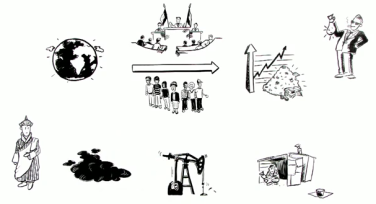Do a country's inhabitants get happier as it gets richer?
一個國家變得更加富有了,他的國民就會越幸福嗎?
Most governments seem to believe so, given their relentless focus on increasing GDP year by year.
大多數政府似乎都是這么認為的,因為他們一直致力于逐年提高GDP。
Reliable, long-term evidence linking wealth and happiness is, however, lacking.
但卻缺乏將財富和幸福聯系起來的可靠且長期的證據。
And measuring well-being is itself fraught with problems,
衡量福祉本身就充滿了問題,
since it often relies on surveys that ask participants to assess their own levels of happiness subjectively.
因為這種衡量依賴于調查,這些調查要求參與者主觀評估自己的幸福水平。
Daniel Sgroi of the University of Warwick and Eugenio Proto of the University of Glasgow,
但英國華威大學的丹尼爾·斯格羅以及格拉斯哥大學的尤金尼奧·普羅托
both in Britain, think, nevertheless, that they have an answer.
認為他們找到了答案。
By examining millions of books and newspaper articles published since 1820 in four countries (America, Britain, Germany and Italy),
他們研究了四個國家(美國、英國、德國和意大利)自1820年以來出版的書籍和報紙文章,
they have developed what they hope is an objective measure of each place's historical happiness.
他們開發出了一種客觀的方法來衡量每個地方的歷史幸福感。

And their answer is that wealth does bring happiness, but some other things bring more of it.
他們的答案是,財富確實能帶來幸福,但其他一些東西能帶來更多的幸福。
Previous research has shown that people's underlying levels of happiness are reflected in what they say or write.
先前的研究表明,人們潛在的幸福水平反映在他們所說或所寫的東西上。
Dr Sgroi and Dr Proto therefore consulted newspaper archives and Google Books,
因此,斯格羅博士和普羅托博士查閱了報紙檔案和谷歌圖書,
a collection of more than 8m titles that constitute around 6% of all books physically published.
這些書籍報紙超過800萬種,占實際出版物的6%。
They searched these texts for words that had been assigned a psychological "valence"—
他們在這些文本中搜索那些被賦予心理“效價”的詞—
a value representing how emotionally positive or negative a word is—
這個值代表著一個詞在情感上是積極的還是消極的—
while controlling for the changing meanings of words such as "gay" and "awful"
同時還控制著“gay”和“awful”等詞詞義的變化
(which once most commonly meant "to inspire awe").
(這些詞曾經最常見的詞義是“讓人敬畏”)。
The result is the National Valence Index, published this week in Nature Human Behaviour.
該研究的結果就是本周發表在《Nature Human Behaviour》雜志上的《National Valence Index》。
Placed alongside the timeline of history, the valence indices for the places under study
沿著歷史的時間軸,研究地區的效價指數
show how changes in national happiness reflect important events.
顯示了國家幸福指數的變化是如何反映重要事件的。
In Britain, for example, happiness fell sharply during the two world wars.
例如,在兩次世界大戰期間,英國幸福感急劇下降。
It began to rise again after 1945, peaked in 1950, and then fell gradually,
其幸福感在1945年后再次上升,并在1950年達到頂點,然后又逐漸下降,
including through the so-called Swinging Sixties, until it reached a nadir around 1980.
包括所謂的搖擺的六十年代,直到1980年左右達到最低點。
America's national happiness, too, fell during the world wars.
美國的國民幸福指數在世界大戰期間也下降了。
It also fell in the 1860s, during and after the country's civil war.
在19世紀60年代以及美國內戰期間和之后,其國民幸福指數也下降了。
譯文由可可原創,僅供學習交流使用,未經許可請勿轉載。











